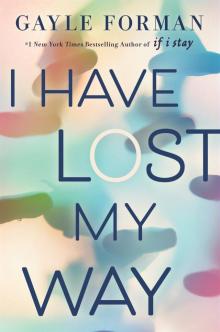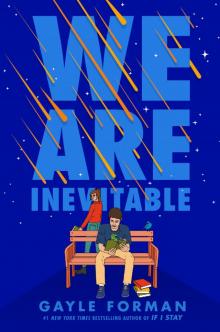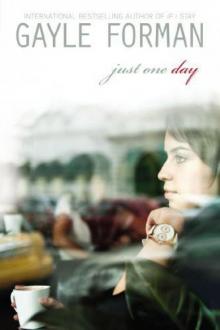- Home
- Gayle Forman
Leave Me Page 3
Leave Me Read online
Page 3
“My husband?” she gasped.
“No idea.” He carried on, telling her about the surgery, a double bypass. “In addition to the punctured vessel, you had a second artery with a significant lesion so as long as we were inside, we grafted that, too. It’s a better long-term fix in the end than the stent so you came out well.”
Huzzah.
He went on to explain what to expect—some discomfort from the leg where they’d harvested an artery and from the sternum, which they’d sawed though to reach her heart. Also some cognitive symptoms, so-called pump head, from the heart-lung bypass machine.
“The what?”
“The bypass machine. What we routed your blood through to oxygenate it and pump it while your heart was stopped.”
He said it so casually. While your heart was stopped. And suddenly, she was yanked from the fog.
She placed her wired-up hand across her taped-up chest. She felt her heart beating there, as it had been since she was a baby, no a fetus even, nestled inside the womb of a mother she had never known. But it had stopped beating. She wasn’t sure why, but this felt like a threshold she had crossed, leaving everyone and everything she had ever known on the other side.
4
A week later, Maribeth was discharged. She didn’t feel remotely ready. It had been that way the last time she’d gotten out of a hospital, but back then, at least it had felt like she and Jason were in cahoots. “They’re leaving us alone with them,” Jason had joked about the twins. “I had more practice with my dad’s Skylark.” Now she was all alone.
“I have something to tell you,” Jason said as Maribeth sat in a wheelchair, waiting for a cab. There was something to his tone. If she wasn’t getting out of the hospital after open-heart surgery, Maribeth might’ve thought he was about to cop to an affair.
“What?” Maribeth asked warily.
“You know how I promised to keep you in the bubble when you were in the hospital, so you didn’t have to worry about anything?”
“Yes.”
“So, I did some things. While you were in the bubble.”
It took a moment for Maribeth to understand what he meant. She was pretty sure she’d have preferred the affair. She shook her head. “No.”
“I kept her out of the hospital,” Jason said. “I even kept you from knowing about it.”
“You took the easy way out. Again.”
“Easy way out? I asked for help.”
“How is my mother help?”
“She’s another set of hands. And the twins love her.”
“Great. The twins get quality time with Grandma and I get a third person to take care of.” A fourth person, she wanted to say, but didn’t.
As the cab sped downtown, Maribeth wanted to turn around, go back to the hospital. On a good day, it took all of her mental reserves to deal with her mother. And this was not a good day.
Jason tentatively touched her on the shoulder. “You okay?”
“You know how you always ask why I’m waiting for the other shoe to drop?” she asked.
He nodded.
“This is why.”
WELCOME HOME MOMMY! GET WELL SOON! read the butcher-paper sign taped to the front door.
She was about to see her children. She had not seen them in a week except for the proof-of-life videos Jason made on his phone to show her each day. She missed them, in an aching, primal, animal way. But standing in front of the door now, she felt paralyzed by dread. Maybe she shouldn’t have asked Jason to keep them home from school today.
Jason opened the door.
On the entry table was a vase of lilies next to a huge stack of mail. The dread deepened.
“Maribeth, is that you?” she heard her mother call.
And deepened again.
“It’s me,” she said.
“Liv, Oscar, did you hear that? Mommy’s home!”
Her mother appeared, dressed up in Chico’s autumnal Palette for Women of a Certain Age. She gingerly embraced Maribeth, then stood back to look at her, her hand over her own heart. “My poor girl.”
Just then Oscar came running. He leaped toward her, yelling, “Mommy!”
She didn’t mean to wince. But her chest was so very tender and Oscar so very puppylike. Keeping him only a little bit at bay, she buried her face in his hair, inhaling that boyish sweaty scent that never fully went away, even after a bath.
“Hello, Mommy.” As Liv approached, taking tentative balletic steps, every ounce of her controlled, ladylike, Maribeth caught a glimpse of the woman her four-year-old daughter would someday become. It made her feel inexplicably sad.
Maribeth braced herself for another hug, but Liv just kissed her lightly on the cheek and stepped away. Last year when Maribeth had a stomach bug, Liv had treated her coolly until she was back to normal.
“It’s okay, baby,” she said. “I’m still me.”
Liv wrinkled her nose, as if she didn’t fully buy that. Maribeth wasn’t sure she did, either.
5
The discharge from the hospital, the ride downtown, the arrival home, all exhausted Maribeth, so she excused herself for a nap. When she woke up, it was unusually quiet for the loft, which didn’t have real walls to mute the clamor of family life.
She called to Jason, who was working at home for the next week.
“Hey.” He smiled. “It’s good to see you home, Lois.”
“It’s good to be home. Where is everyone?”
“Your mom and Robbie took the kids to the playground. Do you want anything?”
Maribeth looked at the clock. “I think the nurse is coming at three. Maybe some lunch?”
“Sure. We ordered pizza before. Brick oven. There’s a few slices left.”
“Not pizza.”
“Right, special diet. We’ve been mostly doing take out. I’ll organize a grocery delivery. Do you want to give me a shopping list? We can do FreshDirect.”
“Yeah, okay,” she said. “For now, maybe some soup.”
“Is canned okay?”
“It’s really high in sodium. Supposed to avoid that.”
“I can run to the deli.”
“It’s okay. I’ll go forage in the fridge.”
“We’ve been keeping it together here with rubber bands and bubble gum,” Jason said. “We’ll get back on track soon.”
MARIBETH WAS FINISHING up her lunch of yogurt and an apple with peanut butter when the visiting nurse arrived. Luca was pleasantly plump and wore the crooked smile of an accomplice.
She checked the dressing on her chest and the one on her leg. “Healing nicely,” she said.
“Yes, I’m so looking forward to the scars,” Maribeth said.
“Some women see their scars as a badge. I’ve worked with breast cancer survivors who go for tattoos instead of reconstructions. You could get a really nice one along your leg, like this.” She lifted her pant leg and showed a daisy chain circling her ankle.
“Funny. My husband used to say that scars were like tattoos but with better stories.”
“I can see that, too. As for the chest.” She tapped her own ample cleavage, “it fades so much it looks like décolletage. It’s very sexy.”
“Now you know why I finagled myself a bypass surgery,” Maribeth said.
Luca laughed. “A sense of humor will go a long way.”
“That and some real food and I’ll be set.” And as if on cue, her stomach gave a good loud gurgle.
Luca looked at the yogurt container, the apple core. “What else have you eaten today?”
“Cereal at the hospital.”
“It’s almost four o’clock.”
“Is it?”
Luca stopped typing notes. “You need to take care of yourself.”
“I’ll get some groceries delivered tomorrow.”
Luca frowned. “Take care of yourself by asking for help.”
“I’m trying.”
Luca hooked Maribeth up to a portable blood pressure cuff and then a portable EKG machine. A
ll the data went straight to her iPad. “Looks good,” she said. “Get some rest. Eat. You’ll feel much better soon.”
At just that moment the front door opened and the kids bounded in with her mother.
“Is Mommy here?” Liv shouted.
“She’s in her room,” Jason said.
“Mommy?” Oscar yelled. “I want Mommy.”
And just like that, the quiet apartment was filled with noise. Within seconds, Oscar was jumping on the bed, coming perilously close to Maribeth’s bad leg.
Luca arched an eyebrow as she packed up the rest of her things.
“Will you do bedtime tonight?” Oscar asked. “Grandma doesn’t do voices and Daddy doesn’t know how to catch Liv’s bad dreams.”
“I’m supposed to be taking it easy,” Maribeth said, looking to Luca for confirmation. But she had quietly slipped out.
“You haven’t done stories forever,” Liv said. “And Grandma promised you would.”
“I said maybe she would,” her mother said.
“What if I tuck you in and Daddy reads?”
She looked to Jason for backup, but he was just standing there, smiling. When she’d learned they were having twins—not a huge surprise in the world of IVF—she’d thought they could handle it, no problem. Two of them, two of us. But the math never seemed to work out so neatly. It was like fifth-grade division; there was always a remainder.
She tried again, widening her eyes at Jason in a silent SOS.
“Can’t blame them for missing you,” Jason said. “We all have.”
All she wanted was for someone to tuck her in, read her a story with a happy ending. But they all just stood there watching her: her mother, Jason, Oscar, Liv. She told the twins she would do bedtime tonight.
6
They started coming right away, the visitors. People she really didn’t want to see, like Niff Spenser and Adrienne and the Wilsons, bearing food she either could not eat (like rich casseroles) or didn’t want to (what exactly was the appeal of those edible arrangements?). Her mother treated each visitor like a dignitary, offering elaborate coffee and tea service and then leaving the mess in the sink. Maribeth found the visits painful and exhausting. Every time someone came, she felt obliged to entertain when she just wanted to stay in bed. But when she suggested that Jason discourage people from coming, he told her she needed to learn to accept help.
And then, Elizabeth came. One evening her first week home, carrying a tasteful but clearly expensive flower arrangement that Maribeth recognized as coming from the florist they used for visiting celebrities.
“Elizabeth!” Maribeth’s mother exclaimed. “How wonderful of you to come. And those flowers. Are those peonies? In October? They must have cost a fortune.”
“Hello, Mrs. Klein.”
“It’s Evelyn,” Maribeth’s mother corrected, as she had done for more than twenty years now. “You look gorgeous! That coat is beautiful. Is it wool? Maribeth, Elizabeth is here.”
“I see that,” Maribeth said.
Elizabeth slipped off her boots, a habit also decades old. Before he had complained about the noise of Maribeth’s children, Earl Jablonski had complained about the sound of her and Elizabeth’s heels clicking across the wood floors. “How is Earl?” she asked.
“Frustrated as ever.”
“And how are you?”
She was tired. The twins were getting angry at her for not healing fast enough, for not doing bedtime often enough, for not walking them to school. She could feel Jason’s impatience, too, in every which way. He’d been spooning her tight in the mornings, so she could feel his hard-on pressed right into the small of her back. It reminded her of after her C-section, when he’d been so full of pent-up desire it had felt like a threat.
Jason was out with the children now, taking them shopping for Halloween costumes, a task he seemed daunted by. Liv, meanwhile, had pitched a fit when Maribeth said she wouldn’t be going. “You promised!” she’d cried. She had not promised, or if she had, it was before all this. Maribeth had been tempted to rip open her pajama top, to point at the scar on her chest. To tell Liv (and Jason, too) that her heart had stopped. Did they understand what that meant?
But she hadn’t. She wasn’t a crazy person. And besides, she’d gone to great pains to shield her children from her illness, not rub their faces in it.
“I’m doing great,” she told Elizabeth.
“Would you like some coffee or tea?” her mother asked. “Or we could have wine. It’s almost six o’clock.”
“I’m fine. I don’t need anything.” She put the flowers down on the dining room table and made her way toward the living room area.
“New couches?” Elizabeth asked, pointing to the leather sofas they’d bought after Oscar had scribbled in Sharpie all over the upholstered ones.
“Not that new. We got them about two years ago.” Had it been that long since Elizabeth had been over?
“From IKEA, can you believe it?” her mother chimed in. “Guess how much they cost? Less than a thousand dollars a piece.”
Why did her mother have to announce that? To Elizabeth? Who had a five-thousand-dollar leather Barcelona sofa in her office at work. It wasn’t that Maribeth cared about high design furniture, but the disparity just seemed to emphasize how far they’d drifted for reasons that Maribeth didn’t fully understand.
And then to highlight it even further, Elizabeth asked: “Remember our trip to IKEA? When the bus broke down?”
It was not long after they’d moved into the loft, which Elizabeth had found because she had a nose for things like that—whispered-about sample sales, ten-table restaurants about to get their first Michelin star, rent-stabilized eighteen-hundred-square-foot lofts in Tribeca.
The space was pretty raw back then, no walls, barely a kitchen. Right after they’d signed the lease, they’d taken the bus to the IKEA in New Jersey to buy more kitchen cabinets. It had felt a little like being newlyweds, the two of them zooming down the aisles, bouncing on the display beds, pretending to drink coffees in the kitchens as they fantasized about the life they were embarking on together. It was the same way that they would sometimes meet after work for happy-hour cosmos and burgers and imagine a life of running friendly competing magazines, Newsweek and Time, Vogue, and Harper’s Bazaar. (That was back in the days before magazines started dropping like flies, taking with them any notion of sporting competition.) The lives they were conjuring may have been fantasy, but the joy they got from this shared daydream, that was real. Giddily, palpably real.
On the way back into the city, the bus had stalled on the New Jersey turnpike. People were complaining, barking at the beleaguered driver. But she and Elizabeth had remained under their halo, munching on cinnamon buns, painting their Technicolor future.
Suddenly Maribeth was embarrassed by the IKEA couches. Elizabeth now was an editor-in-chief. She lived in an Upper East Side brownstone with Tom Bishop, her hedge-fund-manager husband, and, when they were home from boarding school, his teenage children. Maribeth still rented the loft she and Elizabeth had first lived in twenty years ago. She wanted to move, to buy a house somewhere in Brooklyn, but New York real estate was a runaway train she had long since missed. She wished she’d had more foresight, like Elizabeth, who when Maribeth decided to move in with Jason, had offered to move out, buying a dirt-cheap condo in the Meatpacking District, which had quadrupled in value by the time she sold it to move in with Tom.
“Mommy! Wait till you see my costume.”
Liv and Oscar burst into the loft, trailed by a defeated-looking Jason. When they saw Elizabeth, they stopped, recognizing her from computer slideshows more than anything else.
“What are you going to be?” Elizabeth asked Liv.
“A pretty witch,” Liv replied.
“What’s a pretty witch?” Maribeth asked.
“Wait. I’ll show you.” Liv raced back toward her room.
“Me, too,” Oscar said, following his sister.
Elizabeth stood
. “Jason,” she said, greeting him with a cordial kiss on the cheek.
“Elizabeth, so good to see you,” he replied.
Jason went to check his e-mail. Liv returned in her costume, which was less a pretty witch than a slutty one. It was also about five sizes too big so it would need to be altered. Well done, Jason.
“She looks like one of those awful child beauty queens,” Maribeth whispered as Liv admired herself in the mirror.
“I was thinking more dwarf prostitute,” Elizabeth said.
“Oh, god. You’re right.”
For a second, they laughed, easily, like before.
“Mommy had a operation and she said it hurts to laugh,” Oscar said. He was dressed as a policeman, which made his protectiveness even sweeter.
“It’s okay, Oskie. It’s Elizabeth. You remember her?” Maribeth said.
“She’s Mommy’s best friend and now she runs the magazine where Mommy works,” Maribeth’s mother explained, returning with wine. She turned to Elizabeth. “It was so generous of you to give her that job.”
“I had to snap her up before someone else did,” she said. “She’s the best in the business.”
Maribeth admired, as she always had, how well Elizabeth handled her mother. Like now, Maribeth’s mother was placing a wineglass in front of Elizabeth and Elizabeth was covering the rim with her fingers until the moment her mother looked about to pour right through her hand and then she accepted the wine as if she’d asked for it all along.
“Do you think you could get us some mineral water, Mom?” Maribeth asked.
“Of course!” her mother chirped.
“Speaking of work, I’ll probably be able to start back next week,” Maribeth said, though that seemed optimistic. Taking a shower was still an enormous exertion. “Working from home maybe.”
“Don’t worry about it.”
“I know you must be scrambling. But I think I’ll be able to dig out of the hole.”
“Don’t give it another thought. Take as much time as you need.” Elizabeth waved her hand, a perfect expression of noblesse oblige.

 Just One Year
Just One Year If I Stay
If I Stay Where She Went
Where She Went Sisters in Sanity
Sisters in Sanity I Have Lost My Way
I Have Lost My Way Just One Day
Just One Day I Was Here
I Was Here We Are Inevitable
We Are Inevitable Just One Night
Just One Night Just One Day jod-1
Just One Day jod-1 Just One Day 02: Just One Year
Just One Day 02: Just One Year Just One Year jod-2
Just One Year jod-2